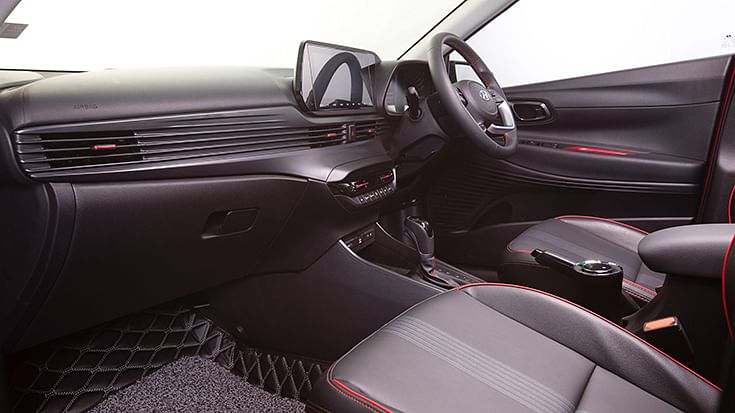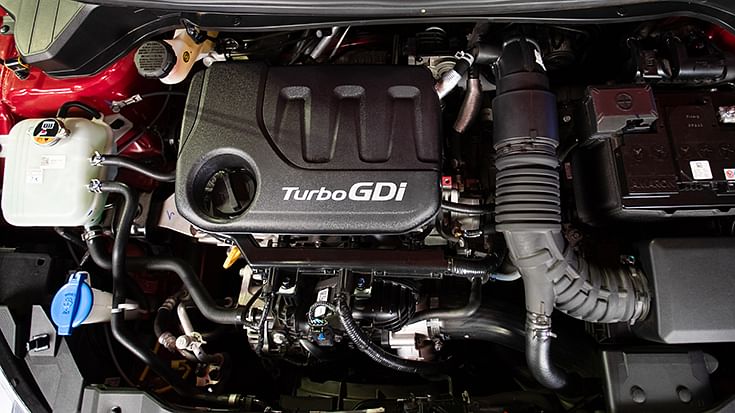Hyundai Motor India targets premium pace in sales with new i20
Carmaker aims to strengthen its 33 percent market share in the premium hatchback category with enhanced offering.
India’s second-largest car manufacturer by sales volumes, Hyundai Motor India, which sold 56,605 units last month (October 2019: 50,010 / +13.2%) to register its best-ever performance in the past two decades, today introduced the third-generation i20 premium hatchback.
The third-generation Hyundai i20 has been priced between Rs 680,000 to Rs 1,118,000, ex-showroom, India. The prices will remain applicable for all customer deliveries until December 31.
The car which first went on sale in the country in 2009, can be attributed to have kickstarted the premium hatchback segment that now features at least one product from almost every carmaker, including Maruti Suzuki (Baleno), Honda (Jazz), Tata Motors (Altroz), and Volkswagen (Polo). With the i20, Hyundai holds a significant 33 percent share of the growing segment and has been averaging sales of close to 100,000 units every year over the last five years.
The Hyundai i20 is a global product that aims to improve the prevailing weak consumer sentiment around the world due to the Covid-19 catastrophe on most economies, as well as drive Hyundai’s share further up by playing on the cards of connectivity, attractive styling, and powerful engines.
Speaking at the launch of the car, WH Lee, president and CEO, Hyundai Motor Corporation, said, “The current pandemic has caused disruption across economies and impacted businesses significantly. However, it has also created an opportunity for businesses to innovate and adopt to the new environment. Now, technology has a more critical role to play as the automotive industry is being transformed by the megatrends of CASE.As we move forward, Hyundai aims to offer more value to its customers through smart mobility solutions.
“We are preparing for the recovery of the auto industry and developing new technologies ahead of the curve. The ultimate purpose of our transformation is to lead the future trend and be in line with our vision -Progress of humanity.”
“With respect to sustainable mobility, we will equally upscale and expand eco-friendly vehicles and pioneer development of green technologies and try to deploy as much as 44 eco-friendly models worldwide by 2025,” said Lee.
 Bold, athletic and premium
Bold, athletic and premium
Compared to the outgoing model, the new i20 is a complete transformation in the sense of styling, design and features. The car bears Hyundai’s futuristic design language and looks sharp from all angles. The wide grille, forward-sloping silhouette and a chiselled rear end give an athletic stance to the hatchback, clearly in sync with its target customer who Hyundai claims is someone young, self-driven and sophisticated.
According to Simon Loasby, VP and head of Hyundai Styling, Hyundai Motor Company, “The i20 is a confident car and fits well the aspirational spirit of Indian customers. It’s part of the sensuous-sportiness design language of Hyundai wherein we try to connect emotional values with technical attributes and tailor each car into every segment according to the needs of those customer groups.”

The new i20 features dual-beam LED projector headlamps, LED tail lamps, 16-inch diamond-cut alloy wheels, sunroof and shark-fin antenna. On the inside, the car gets an all-black cabin theme with 10.25-inch touchscreen infotainment, Bose premium sound setup, fully-digital instrument cluster, front and rear armrest and cruise control. The car features boot space of 311 litres.
In terms of safety, the car gets six airbags, ABS with EBD, ESP, vehicle stability management and ISOFIX. Hyundai also claims that the new i20 has seen an improvement of 13 percent in terms of its tensile strength.
New powertrain strategy
While the new-generation model will continue with the 1.2-litre, four-cylinder, 83bhp petrol and a BS VI-compliant 1.5-litre diesel engine options, Hyundai has also introduced the 1.0-litre, three-cylinder turbocharged petrol from the Venue. The engine produces 118bhp and 171nm.

Hyundai is deploying its new drivetrain strategy in the i20 too and is offering a flurry of transmission options including a 5MT, 6MT, iMT, CVT (IVT in Hyundai speak) and 7-speed DCT as well. The 1.2 petrol will come mated to 5MT or an IVT, 1.0 petrol with 5-iMT or 7DCT and 1.5 diesel with a 6MT option to claim the most fuel-efficiency in the segment for a diesel at 25.2kpl.
Hyundai bullish to cement leadership
Hyundai Motor India, which has seen a consistent uptick in its contribution to the overall passenger vehicle market in India with a 17.6 percent market share between April and October 2020, says despite Covid-19 challenges, the calendar has been a good year for the company as it has been able to continuously engage with customers through new launches.
The new i20 is its third brand-new launch in the year after introducing the Aura compact sedan in January, followed by the second-generation Creta midsized SUV in March, that has disrupted the segment to already garner over 115,000 bookings since launch. With the i20, the company is bullish to cement its stronghold in the premium hatchback segment where the car already has a healthy lead over arch rival Maruti Suzuki Baleno by selling over 1.5 million units since 2009, compared to latter’s 800,000 units running on the roads. However, the Baleno has been catching up fast as it is already halfway up i20’s sleeves and was only launched in October 2015.
Shedding light on the prevalent scenario in the premium hatchback segment, Tarun Garg, director, Sales and Marketing, Hyundai Motor India, said, “The premium hatchback category has evolved to become the largest part of the entire hatchback segment, and today constitutes to about 26 percent of the overall hatchback market. It is also at an historic high of 13 percent with respect to overall PV sales. This is all because of the evolution of the Indian car market, disposable incomes going up and customers becoming more demanding.”
While about 55 percent of the i20 buyers are first-time car owners, thetop Sportz and Asta trims are the ones comprising more than 80 percent of the sales of the premium hatchback. Now, with more features such as sunroof, Bose premium sound setup and turbo-petrol option in the top variants, Hyundai is anticipating surge for the top-end trims, at least in the urban markets where demand is still lower compared to towns with agricultural-intensive economies.
PV industry recovery still some time away
The automotive industry has been showing signs of recovery and demand coming back into the market over the past few months, with October especially bringing a glimmer of hope, with carmakers like Hyundai recording their best-ever monthly sales.
According to Garg, “We can look at India by dividing it into two types of states - places such as Uttar Pradesh, Rajasthan, Punjab, West Bengal and Himachal Pradesh - where dependence on agricultural economy is high, and states like Delhi, Gujarat and metro cities – which are less agrarian. The rate of recovery between April and September has been as much as 50 percent higher in the agriculture-dependent economies as compared to urban cities. However, with gradual lifting of restrictions, growth has started to come back even in urban places in October.”
Even though demand is there, it could largely be pent-up from postponed purchases from March when the Covid-19-induced nationwide lockdown was enforced, shutting business activities throughout the country. “From March until June,approximately 10 lakh people had postponed their car buying decisions, of which about 80 percent are still willing to buy a car in the near future, as per our research. So, our estimates suggest that this pent-up demand would continue throughto end-March 2021, and from a mid-to-long term perspective, growth will largely depend upon overall GDP improvement and when other industries also start showing some traction.The auto industry will automatically follow suit,” Garg explained.
“It would be too early to say that the industry has fully recovered and we would need to be monitoring the market and the economy for a longer time.The Covid-19 pandemic has made us understand that we need to be flexible and monitor the market on a month-on-month basis and cater to customers’ needs by becoming more flexible and agile,” he added.
Growth in digital sales
The company is also confident about its digital initiatives such as the Click-to-Buy platform, which was rolled out across the country earlier this year in March to link a major portion of Hyundai’s dealers on a centralised retail platform, and has received over five million customer footfalls since then.
“We have received close to five million visits on the website, and digital along with CRM today constitute to about 30 percent of our overall inquiries. While the customer is increasingly moving towards digital mediums to buy new products, car buying is still an emotional decision and people prefer coming to the showroom to take deliveries of their cars,” Garg said.
While the company claims having received 10,000 units of bookings for the new i20, it expects over20 percent demand for the new turbo-petrol engine, which in the bigger sibling Venue’s case is as much as 30-35 percent. It also expects good turnaround for the innovative clutch-less automatic option with the 1.0-litre turbocharged petrol, as it is already experiencing over 60 percent conversion rate for the new technology offered in the subcompact SUV. With both Venue and i20 now falling in approximately the same price band, Hyundai is also confident about growth not coming at the cost of cannibalisation as both segments cater to distinct buyer requirements, as per Hyundai Motor India.
RELATED ARTICLES
Cosmo First diversifies into paint protection film and ceramic coatings
The Aurangabad, Maharashtra-based packaging materials supplier is leveraging its competencies in plastic films and speci...
JSW MG Motor India confident of selling 1,000 M9 electric MPVs in first year
The 5.2-metre-long, seven-seater luxury electric MPV, which will be locally assembled at the Halol plant in Gujarat, wil...
Modern Automotives targets 25% CAGR in forged components by FY2031, diversifies into e-3Ws
The Tier-1 component supplier of forged components such as connecting rods, crankshafts, tie-rods, and fork bridges to l...






 05 Nov 2020
05 Nov 2020
 11912 Views
11912 Views
















 Autocar Professional Bureau
Autocar Professional Bureau




